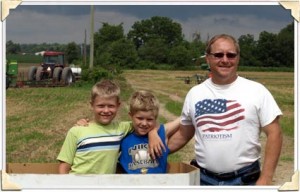Harrington, DE
David Marvel Jr. and his family grow fruit and vegetables for both the fresh and processed market on  their 1,000-acre farm in Delaware. They specialize in Mar-Del watermelons, a local brand they share with farmers in both Maryland and Delaware. David is president of the Fruit and Vegetables Growers Association of Delaware (FVGAD), and serves on a number of boards and committees making the critical connection between public health and family farming. Under his leadership, FVGAD started the first farm to school program in Delaware and continues to lead the way in getting farm fresh food into rural public schools in the state.
their 1,000-acre farm in Delaware. They specialize in Mar-Del watermelons, a local brand they share with farmers in both Maryland and Delaware. David is president of the Fruit and Vegetables Growers Association of Delaware (FVGAD), and serves on a number of boards and committees making the critical connection between public health and family farming. Under his leadership, FVGAD started the first farm to school program in Delaware and continues to lead the way in getting farm fresh food into rural public schools in the state.
David Marvel Jr.’s family has been in the business of farming for many years – since 1650, to be exact. In just the last generation, however, the Marvels have witnessed a major transition toward an increasingly industrial agricultural system in which farms are forced to get bigger just to keep up. “I don’t blame farmers for this shift,” David explains, “I blame our country for letting agriculture get this way.”
David fully recognizes the struggle for family farmers to stay afloat under current conditions, especially for mid-sized farms that are being left out of the economies of scale of large production agriculture and the burgeoning direct markets of small-scale, niche production. With farm to school programs, however, David and other small to mid-sized family farmers are finding a viable solution.
While farm to school programs certainly have their challenges, David refers to these expanding opportunities as “America’s diamond.” If you look at farm to school programs from one angle, he explains, you see the many health benefits to children facing epidemics of obesity and chronic diseases. You shift the “diamond” slightly and the educational contributions of farm to school programs shine through, putting an important face on food and teaching children about nutrition, agriculture and the environment. Make another turn, and you see the opportunities for family farmers to build food and farm security in areas that might not otherwise have access to fresh fruits and vegetables or viable markets for family farmers. David explains, “There are so many facets of farm to school, which is why these programs are so important to our country.”
David first got the idea about connecting farm-fresh produce and local schools during a presentation about kids and obesity put on by Nemours Health and Prevention Services (NHPS). The presentation was part of an educational credit series in which he and other fruit and vegetable farmers take part each year.
“I thought it would be great if we could get these children to eat more local fruits and vegetables,” David explains. According to his statistics, there are 10,000 acres of fresh market and 32,000 acres of processed fruit and vegetables in the state – beans, sweet corn, peas, spinach, string beans, cantaloupe, strawberries, and David’s specialty: watermelons. Which means there are plenty of healthy options for children and opportunities for area family farmers to get involved.
Since David’s first encounter with farm to school in 2007, he has led the Fruit and Vegetable Growers Association of Delaware as its president in starting Delaware Farms to Delaware Schools, Delaware’s first farm to school program. Every week, over 11,000 students gain access to fresh, local fruits and vegetables. The program is expected to reach another 25,000 students in the coming year and the new Delaware Secretary of Agriculture, Ed Kee, has set up a meeting with food service directors and superintendents in the fall, to talk about serving all students in the state in the near future. During this time, David was also awarded the Vision Award for his hard work from NHPS, the same group that initially sparked his interest in getting healthy food to local school children.
So, what’s the biggest challenge for farmers interested in farm to school programming? Without hesitation, David points to distribution. He explains that there are two typical situations: the largest schools that need more product generally don’t have farms around them while the smaller schools with more access to farmland don’t have as much demand. Farmers have to leave their farm to make deliveries, whether they are delivering 100 pounds or 1,000 pounds. There needs to be a better way to make such deliveries both efficient and profitable.
To help address this challenge, David is hard at work improving the entire pathway from farm to school. In his efforts, David has reached out to Delaware local processors, both to keep the local industry thriving and to assist in strengthening the farm to school market for area farmers. The local capacity to freeze vegetables has the added benefit of enabling schools to enjoy local product year round.
Talking to David about his farm to school experience calls to mind an old Chinese Proverb: “Better a diamond with a flaw than a pebble without.” While David and other advocates for farm to school programs are still working hard to get the policy and infrastructural support (PDF link) needed to really shine, these programs are an incredible opportunity for our nation’s farmers and children, now and in the future.
“Our main purpose in all of this is for our kids to have a market in the future,” David explains. He credits his young son and nephew (seen in picture) for being the core motivation behind his advocacy for farm to school. “We need to sustain local farmers who care about their environment and pass their love on to their children. If they chose to farm, we want our kids to have a market that is profitable. We’re not going to increase land, we need to make more on less acreage for future generations to keep on farming.”
For more information on farm to school in Delaware and your state, visit the National Farm to School program site for comprehensive listings.
And to learn more about the extensive benefits of farm to school, check out our Farm to School Rocks page.


